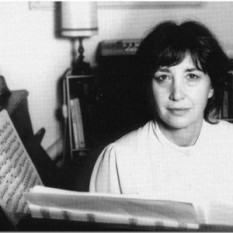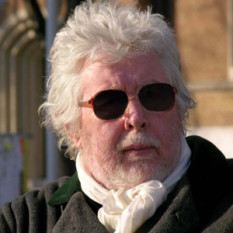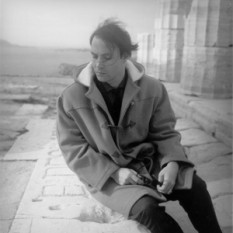Augustyn Bloch, the composer and organist, was born on 13th of August 1929 in Grudziadz. He was an organ student of Feliks Raczkowski and a composition student of Tadeusz Szeligowski at the National Higher School of Music (nowadays the Academy of Music) in 1950-5 and 1952-9, respectively. In 1947-57, when still a student, Bloch gave organ concerts in Wroclaw, Oliwa and Warsaw. In 1954-77 he had a contract with the Polish Radio Theatre to write music for its plays. In 1977-9 and 1983-7 Bloch was the Vice-President of the Association of Polish Composers, and in 1979-87 he chaired the Program Committee of the "WARSAW AUTUMN" INTERNATIONAL FESTIVAL OF CONTEMPORARY MUSIC.
Bloch was the winner of international composing competitions in Vercelli (1961) for his PIANO VARIATIONS "KAROL SZYMANOWSKI IN MEMORIAM" (1953) and twice in Monaco: for MEDITATIONS for soprano, organs and percussion in 1962 and for his EXPECTATION ballet in 1963.
In 1969 Bloch was third at the UNESCO's International Composers' Tribune in Paris for his DIALOGHI PER VIOLINO ED ORCHESTRA (1964). In 1989 the composer received the Brighton Festival award for the ORATORIUM for organ, strings and percussion, composed in 1982. He is also a two-time winner of the Minister of Art and Culture award: for ENFIANDO PER ORCHESTRA (1970) and for the ballet GILGAMESH (1968), received in 1971 and 1985, respectively.
Bloch's radio compositions for children earned him the award of the Radio and Television Committee in 1960 and of the Chairman of the Council of Ministers (for his music for children and youth, and in particular for the opera-ballet THE BEAUTY IS VERY MUCH ASLEEP) in 1973. In 1981 Bloch received the annual award of the Association of Polish Composers. He is also the holder of the Chevalier Cross and the Officer Cross of the Poland's Revival Order, conferred in 1969 and 1979, respectively.
Augustyn Bloch's compositions are to a large extent determined by his interest in the organ. This interest has its origins in his family home, his father having been the organist at the Grudziadz parish church. The composer always looks back to his childhood, when he spent long hours at the gallery, listening to his father play. When Bloch went to study the organ at the National Higher School of Music, his professor was Feliks Raczkowski, the distinguished organ teacher. At the same time Bloch worked as an organist in the churches of Gdansk and Warsaw. When studying composition with Tadeusz Szeligowski, Bloch composed his first piece, FANTASIA PER ORGANO (1953). Another composition written in his student years was the ORGAN SONATA from 1954. Bloch was later to compose other pieces for solo organ, notably JUBILATE (1974) and FORTE, PIANO ET FORTE (1985). The organ will also appear in many other of his compositions, including THE MEDITATIONS for soprano, organ and percussion (1961), THE ORATORIUM for organ, strings and percussion (1982), CANTI PER CORO ED ORGANO (1984), FOR THINE LIGHT SHALL COME, a psalmodia for voice, organ, choir and orchestra (1987), HAC FESTA DIE PER ORGANO, CORO ED ORCHESTRA (1996) and ORATORIUM GEDANENSE 1997 PER ORGANO, CORO ED ORCHESTRA (1997).
After a short spell of playing concerts as an organist, his own music included, Bloch gave up that career to focus exclusively on composing. Initially influenced by neoclassicism, he got briefly interested in dodecaphony. Yet it is the sound that has always been central to Bloch's composing language. One of his most interesting sound experiments is ANENAIKI (1979), a piece in which the composer uses a choir consisting of sixteen voices to obtain unusual sound effects, including aliquot sounds. Sonorous effects are an important means of expression even in Bloch's religious pieces.
The religious trend, in the most general understanding of the word, is very important in Bloch's compositions, presumably owing to his family roots and organ experience. The recent years saw Bloch composing particularly many religious pieces, notably HAC FESTA DIE (1996), THOU SHALL NOT KILL (1990), THE OSTROBRAMSKA LITTANY (1989), EXALTABO TE DOMINO (1987) and FOR THINE LIGHT SHALL COME (1987). A number of such compositions have been inspired by the composer's wife, the excellent singer Halina Lukomska, who has often been the first performer of her husband's vocal and instrumental pieces.
Of special note are also Bloch's accomplishments in the area of stage music. He has written five ballets, a "miracle opera" based on a Biblical text - to use the composer's own words - entitled ALEJET, JEFTE'S DAUGHTER (1967), a musical PAN ZAGLOBA (1971), a children opera THE BEAUTY IS VERY MUCH ASLEEP (1973) and a children musical THE TALE OF A VIOLIN SOUL (1979).
Remarkably, the children part of Bloch's output is very significant. In addition to the previously mentioned works, Bloch wrote a number of songs for children as well as two pieces for children instrumental groups: WALKING DOWN THE KEYBOARD FOR FOUR SMALL HANDS AND AN EQUALLY SMALL PERCUSSION for piano and percussion (1981) and TRAVELLING WITHOUT A TICKET ACROSS EUROPE AND A SMALL PERCUSSION for piano and percussion (1982). These compositions use modern playing techniques in ways fully accessible to children of a few years old. .
You can find information through the best music search engine - Muzlan.top 😊All materials on request "Augustyn Bloch" are available on page Augustyn Bloch
Yes of course. You can listen tracks on the page Augustyn Bloch
Yes of course. You can download tracks on the page Augustyn Bloch
This page is found by queries: Augustyn Bloch all mp3, Augustyn Bloch song download, Augustyn Bloch song listen, Augustyn Bloch flac, Augustyn Bloch track minus




